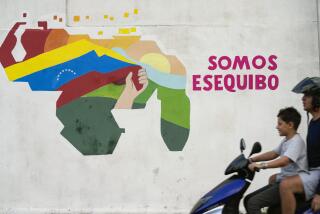Latin Border Dispute Takes Wing With Aves Isle
- Share via
CARACAS, Venezuela — Venezuela reacted fiercely when tiny Eastern Caribbean states recently questioned its 136-year-old claim to a patch of coral that is closer to Puerto Rico than to Venezuela.
“We don’t want any problems. But Aves Island has always been Venezuelan,” President Hugo Chavez warned.
The 12 acres of Aves, Spanish for “bird,” are home to a few fishermen and a decrepit weather station. But it joins a list of territorial disputes that have vexed Venezuela’s neighbors.
Most borders in Latin America were carved out under European colonial rule, but wars and treaties continue to shape them in the post-colonial era.
Over the centuries, Latin border disputes have simmered between Argentina and Chile, Chile and Bolivia, within Central America, and between Ecuador and Peru, which have warred over the issue.
Similar disputes simmer around the world, particularly in east Asia, where Japan, China and a half-dozen neighbors quarrel constantly over tiny Pacific reefs and uninhabited islands that straddle fishing grounds and oil deposits.
But in Latin America, “there are raging border disputes that spill over into sports and politics,” said Cedric Johnson, a historian at the University of Guyana and former diplomat. “They don’t always reach the battlefield, but they do reach the football [soccer] field.”
War broke out in 1969 between El Salvador and Honduras over disputed territory. The fighting, which killed 6,000 people, was called the “soccer war” because it followed a World Cup qualifying game.
Last year, police deployed in force at a soccer match between Honduras and Nicaragua to prevent fan violence over a feud involving a swath of the Caribbean claimed by Honduras.
Venezuela scrambled fighter planes when it believed a U.S. Coast Guard ship was in its territorial waters last October. But the leftist Chavez, for all his talk of Latin America uniting against an American-led new world order, has not shied from rekindling border conflicts with Venezuela’s own neighbors--Guyana to the east and Colombia to the west.
“This is a government that likes to pick fights,” said Venezuelan historian Manuel Caballero. “This is nothing put patriotic commotion. The government needs it to maintain its popularity.”
Caballero suggested that Chavez fans the fatherland rhetoric to distract attention from domestic problems like unemployment and crime.
But more than sovereignty is at stake. With territory come fishing, mining, petroleum and natural gas rights. Venezuela is already one of the world’s largest oil producers, and its claims to Guyana’s mineral-rich Essequibo region and the northern Gulf of Venezuela could be worth billions.
For more than a century, Venezuela has sparred with the colony of British Guiana, now independent Guyana, over the Florida-sized Essequibo.
Venezuela never recognized an internationally brokered 1899 treaty that granted Essequibo to British Guiana. It argues that a Russian diplomat took a bribe from Britain to vote the colony’s way.
In 1966, the United Nations acknowledged that Venezuela’s claim ought to be investigated. U.N. representatives maintain a low-profile effort to find a solution.
Chavez also revived a dispute with Colombia this year by personally leading naval exercises near the disputed section of the Gulf of Venezuela.
Now comes Aves, an island that leaders of the 15-member Caribbean Community trade bloc dismissed at a July summit as merely a “geologic feature.”
No one had questioned Venezuela’s sovereignty over Aves since 1859, when American businessmen wanting to harvest guano asked the United States to challenge Venezuela. The United States refused.
The Organization of Eastern Caribbean states doesn’t want the island, but worries Venezuela will claim territorial rights nearly reaching the shores of Antigua, Dominica, Grenada and St. Lucia. Dominica is 70 miles east of Aves; Venezuela is 350 miles south.
Under the U.N. Law of the Sea Convention, countries can claim economic rights up to 125 miles at sea. The OECS wants to discuss who has rights surrounding Aves.
“We will not discuss it,” insisted Foreign Minister Luis Alfonso Davila.
Venezuelan politicians and military officers visited Aves in recent weeks and announced a $10-million refurbishment of the weather station.
Some analysts think Venezuela’s neighbors are using Chavez’s reputation for left-wing activism as a lever.
“There is a bit of an opportunistic attitude here. Venezuela is a country with political conflicts with Andean countries and with the United States. These small islands are taking advantage of this, believing that this is the right moment to exert pressure and seek gains,” said political columnist Fausto Maso.
More to Read
Sign up for Essential California
The most important California stories and recommendations in your inbox every morning.
You may occasionally receive promotional content from the Los Angeles Times.













